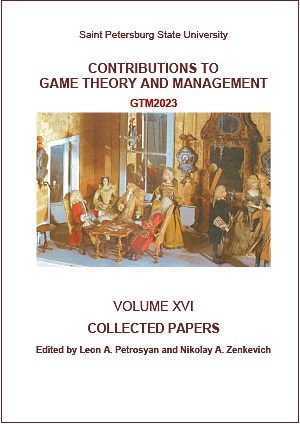Symmetric Nash Equilibrium Arrivals to Queuing System
Abstract
We consider a game-theoretic setting for the queuing system
models where input process of arrivals is strategic. This paper generalizes
a methodology for the symmetric Nash equilibrium exploring in queuing
system with loss. We assume that the system admits customer requests at
the time interval [0, T]. Each of customers chooses the moment to send his
request into the system maximizing his payoff. Several models of certain systems are presented as examples demonstrating a result of the methodology application.
Keywords:
Queueing system, Strategic customers, Optimal arrivals, Kolmogorov backward equations, Nash equilibrium
Downloads
References
Altman, E., Shimkin, N. (1998). Individually optimal dynamic routing in a processor sharing system. Oper. Res., 46, 776–784.
Breinbjerg, J., Platz, T. T., Østerdal, L. P. (2022). Equilibrium Arrivals to a Last-come First-served Preemptive-resume Queue. Working Papers 17-2020, Copenhagen Business School, Department of Economics. https://ideas.repec.org/p/hhs/cbsnow/2020_017.html">https://ideas.repec.org/p/hhs/cbsnow/2020_017.html. Last accessed 28 Apr 2022
Chirkova, Yu. V. (2020). Optimal Arrivals in a Two-Server Rational Random-Access System with Loss. Automation and Remote Control, 81(7), 1345–1365.
Chirkova, Yu. V. (2017). Optimal arrivals in a two-server random access system with loss. In: Automation and Remote Control, 78(3), 557–580.
Chirkova, J. V., Mazalov, V. V. (2022). Optimal Arrivals to Preemptive Queueing System. Mathematical Optimization Theory and Operations Research. 21st International Conference, MOTOR 2022, Petrozavodsk, Russia, July 2–6, 2022, Proceedings. Lecture Notes in Computer Science, Vol. 13367, pp. 169–181. Springer, Cham.
Chirkova, J. V. (2023). Equilibrium Arrivals to Preemptive Queueing System with Fixed Reward for Completing Request. In: Mathematical Optimization Theory and Operations Research. MOTOR 2023. Lecture Notes in Computer Science, Vol. 13930. Springer, Cham.
Glazer, A., Hassin, R. (1983) ?/M/1: On the equilibrium distribution of customer arrivals. Eur. J. Oper. Res., 13, 146–150.
Hassin, R., Kleiner, Y. (2011). Equilibrium and optimal arrival patterns to a server with opening and closing times. IIE Trans., 43, 164–175.
Haviv, M. (2013). When to arrive at a queue with tardiness costs. Perform. Eval., 70, 387–399.
Haviv, M., Ravner, L. (2021). A survey of queueing systems with strategic timing of arrivals. Queueing Syst., 99, 163–198.
Jain, R., Juneja, S., Shimkin, N. (2011). The concert queueing game: To wait or to be late. Discret. Event Dyn. Syst., 21, 103–138.
Mazalov, V. V., Chuiko, J. V. (2006). Nash equilibrium in the optimal arrival time problem. Comput. Technol., 11, 60–71.
Ravner, L., Haviv, M. (2015). Strategic timing of arrivals to a finite queue multi-server loss system. Queueing Syst., 81, 71–96.
Ravner, L., Haviv, M. (2014). Equilibrium and Socially Optimal Arrivals to a Single Server Loss System. In: Int. Conf. on Network Games Control and Optimization 2014 (NETGCOOP'14), Trento, Italy, October 2014.
Teraoka, Y., Hohjo, H. (2006). N-person silent game on sale. Scientiae Mathematicae Japonicae, 63.2, 237–240.
Downloads
Published
How to Cite
Issue
Section
License
Articles of "Contributions to Game Theory and Management" are open access distributed under the terms of the License Agreement with Saint Petersburg State University, which permits to the authors unrestricted distribution and self-archiving free of charge.




